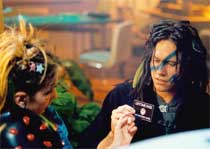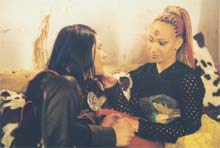 Most of us are fortunate in that we have access to a wide range of goods and services. We can go down to the local supermarket and choose from a large variety of foods. Appliances and furniture are readily available. Services such as health and education are easily accessible. Providing that you have enough money to pay for them, it would be fair to say that many of us have more product choice than at any other time in human history. Most of us are fortunate in that we have access to a wide range of goods and services. We can go down to the local supermarket and choose from a large variety of foods. Appliances and furniture are readily available. Services such as health and education are easily accessible. Providing that you have enough money to pay for them, it would be fair to say that many of us have more product choice than at any other time in human history.In the Tribe, the Mall Rats are limited in their access to a number of commodities that we would expect to have as basic requirements. Food and medicine are in short supply. Water and electricity are controlled by the Technos. Housing is run down and people are forced to live in buildings such as shopping malls. There are certain factors that prevent the Tribe from having access to commodities and services. These include:
Third world countries or areas in a state of civil emergency are often helped out by organisations such as Red Cross and aid from foreign countries. They help provide supplies of certain commodities, such as food and medical supplies. Because the City is isolated, the Tribe receives no such relief. It is only through their own resourcefulness that the Tribe is able to survive. Trading occurs in the market place. Many items are scarce and choice is very limited. Although a currency does exist, much of the trade that occurs is through bartering and exchange. Bartering is a traditional method of trade that is still used in many societies. Historically it was common when a single currency was either not in use, rare or next to worthless. During the 1930’s depression for instance, in some countries money became so worthless that goods and services were used for payment. There is a famous photo of some children building a kite with money because the currency is of such little value.
The trading situation in the Tribe is similar to other societies that have been forced to continue in times of unrest or war. In times of war, countries are forced to ration goods that are in short supply. Prices for luxury items go through the roof. The Mall Rats have to be very resourceful, rationing themselves in order to eke out their limited supplies. Because certain items are in short supply during times of war, a black market soon emerges. A black market racketeer is able to get hold of luxury items and sell them at escalated prices to members of the public. In the Tribe, many of the stall owners can probably demand high prices because of demand so heavily outweighing supply.
As a trader it must be hard to get by in the city. Although they can ask high prices, the supply of goods to sell is very unpredictable and a regular livelihood, therefore, never guaranteed. While most governments will take measures to protect their manufacturing and service industries, the Technos have no interest in doing this and as a result manufacturing has collapsed and the economy has continued to decline. |


 In any society, if people are unable to access basic goods and services, the consequences can be hunger, malnutrition, lack of shelter, poor health and failing hygiene. Many present third world societies suffer from these difficulties.
In any society, if people are unable to access basic goods and services, the consequences can be hunger, malnutrition, lack of shelter, poor health and failing hygiene. Many present third world societies suffer from these difficulties. In Tribe IV, we can see the affect on the city when codes for entry into ‘The Game’ come onto the market. Codes, such a valuable item, become almost a currency in themselves. At different times in history, commodities such as gold, rice, bread and even water have been in such short supply that they have been used as payment.
In Tribe IV, we can see the affect on the city when codes for entry into ‘The Game’ come onto the market. Codes, such a valuable item, become almost a currency in themselves. At different times in history, commodities such as gold, rice, bread and even water have been in such short supply that they have been used as payment. In this state, corruption often occurs. We see how Lex is able to get hold of luxury items because of his powerful position. He is able to furnish his Love Nest and spoil Siva with gifts. Lex also dares to trade with the Technos. He is able to get hold of Game codes in exchange for a case of wine. Opportunists such as Lex often thrive in this type of situation.
In this state, corruption often occurs. We see how Lex is able to get hold of luxury items because of his powerful position. He is able to furnish his Love Nest and spoil Siva with gifts. Lex also dares to trade with the Technos. He is able to get hold of Game codes in exchange for a case of wine. Opportunists such as Lex often thrive in this type of situation.